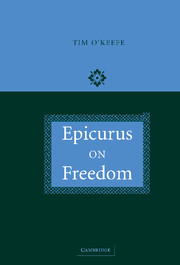Book contents
- Frontmatter
- Contents
- Acknowledgments
- List of abbreviations
- Introduction
- Chapter 1 What sort of an incompatibilist is Epicurus?
- Chapter 2 Lucretius on the swerve and voluntas
- Chapter 3 Aristotle and Epicurus on the origins of character and action
- Chapter 4 Epicurus' reductionist response to Democritean fatalism
- Chapter 5 The swerve and collisions
- Chapter 6 The swerve and fate
- Chapter 7 Epilogue: Epicurus and the invention of libertarian free will
- Appendix: Some texts
- References
- Index
Chapter 2 - Lucretius on the swerve and voluntas
Published online by Cambridge University Press: 22 September 2009
- Frontmatter
- Contents
- Acknowledgments
- List of abbreviations
- Introduction
- Chapter 1 What sort of an incompatibilist is Epicurus?
- Chapter 2 Lucretius on the swerve and voluntas
- Chapter 3 Aristotle and Epicurus on the origins of character and action
- Chapter 4 Epicurus' reductionist response to Democritean fatalism
- Chapter 5 The swerve and collisions
- Chapter 6 The swerve and fate
- Chapter 7 Epilogue: Epicurus and the invention of libertarian free will
- Appendix: Some texts
- References
- Index
Summary
The natural place to look when trying to figure out the role of the swerve in free action is Lucretius' description in DRN 2 251–293 of why the swerve is needed to preserve our voluntas, and a great deal of attention has been lavished on this passage. So, in this chapter I will consider what we can learn about the Epicurean position from Lucretius. As far as the swerve itself is concerned, my conclusions will be mostly negative: Lucretius' description of the swerve tells us remarkably little about the role it is supposed to play in preserving our freedom. However, his descriptions in DRN 4 877–896 of voluntary action and in DRN 2 251–293 of the voluntas the swerve preserves both show what sort of freedom the Epicureans are concerned to defend against the threat of determinism. I will first examine DRN 2 251–293, and then DRN 4 877–896, and show that the De rerum natura undercuts the thesis that Epicurus' concerns are much like those of modern libertarians. Finally, I will turn explicitly to a consideration of the traditional interpretation, that every volition is constituted by a swerve, since the main textual support for this family of interpretations is DRN 2 251–293, and I will argue that De rerum natura actually gives us good reason to reject this interpretation of the Epicurean position.
DRN 2 251–293
DRN 2 251–293 is the longest passage we have by an Epicurean that describes the connection of the swerve to free action.
- Type
- Chapter
- Information
- Epicurus on Freedom , pp. 26 - 47Publisher: Cambridge University PressPrint publication year: 2005



